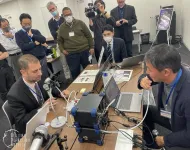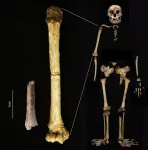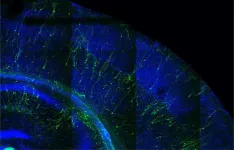(Press-News.org) Minxiang “Glenn” Zeng, an assistant professor in the Department of Chemical Engineering at Texas Tech University, has been awarded a $250,000 grant from the Launching Early-Career Academic Pathways in the Mathematical and Physical Sciences (LEAPS-MPS) award from the National Science Foundation (NSF) to further his research about printable semiconductors and electronics under extreme environments.
The grant supports Zeng’s work in understanding and controlling the thermal degradation pathways of printed metal chalcogenides, which are semiconductor materials including selenides, tellurides and sulfides. His goal is to develop strategies to enhance the thermal stability of metal chalcogenide materials, which will help design resilient semiconductor chalcogenides for printed electronics.
Semiconductors can be found virtually everywhere, including in computers, sensors and healthcare devices. Discovering how to make metal chalcogenide materials thermally stable would enable chalcogenide-based solar cells to be more durable in hot climates and allow for more stable sensors in spaceships.
“The ability to expand the options in addition to silicon semiconductors is important,” Zeng said. “However, metal chalcogenides are not very stable at high temperatures. This research will help fill this gap by enhancing their stability, which is critical for large-scale application.”
This research also will help address the global electronic waste problem.
“A lot of electronics have semiconductor components and their service life is also related to whether those are stable,” Zeng explained. “So, if we can enhance this stability, then the electronics might last longer and we’ll have less e-waste.”
Under the LEAPS-MPS grant, Zeng plans to develop a printing-based, high-throughput synthesis technique for solid-solution chalcogenides. He compares this innovative method to cooking 10 recipes at a time versus one, without the high-energy processes typically required with synthesizing and manipulating complex chalcogenide systems.
“This includes not only solid-solution metal chalcogenides but potentially applicable metals, oxides, ceramics and advanced composites,” Zeng said. “It will enable faster and more detailed exploration of their thermal, chemical and electronic properties.”
The project aligns with the department’s strengths in material research on semiconductors and is expected to enhance the research infrastructure. This will attract top-tier students, further establishing the Edward E. Whitacre Jr. College of Engineering as a leader in semiconductor research and materials science. It also will foster interdisciplinary collaboration in developing environmentally resilient solid-solution metal chalcogenides.
“Research carried out in Dr. Zeng’s group will have a strong impact in the field of printable semiconductors,” said Rajesh Khare, the department chair of Chemical Engineering.
The project includes a strong component of teaching and educational outreach. Integrating research outcomes into the curriculum will provide students with knowledge and experience in the latest techniques, such as high-throughput synthesis.
“When people think of semiconductors, they might not often consider options beyond traditional rigid silicon,” Zeng said. "However, there are many possibilities in semiconductors, and at Texas Tech, we are exploring emerging candidates like printable electronics made from semiconductor nano-inks.
Minxiang “Glenn” Zeng, an assistant professor in the Department of Chemical Engineering at Texas Tech University, has been awarded a $250,000 grant from the Launching Early-Career Academic Pathways in the Mathematical and Physical Sciences (LEAPS-MPS) award from the National Science Foundation (NSF) to further his research about printable semiconductors and electronics under extreme environments.
The grant supports Zeng’s work in understanding and controlling the thermal degradation pathways of printed metal chalcogenides, which are semiconductor materials including selenides, tellurides and sulfides. His goal is to develop strategies to enhance the thermal stability of metal chalcogenide materials, which will help design resilient semiconductor chalcogenides for printed electronics.
Semiconductors can be found virtually everywhere, including in computers, sensors and healthcare devices. Discovering how to make metal chalcogenide materials thermally stable would enable chalcogenide-based solar cells to be more durable in hot climates and allow for more stable sensors in spaceships.
“The ability to expand the options in addition to silicon semiconductors is important,” Zeng said. “However, metal chalcogenides are not very stable at high temperatures. This research will help fill this gap by enhancing their stability, which is critical for large-scale application.”
This research also will help address the global electronic waste problem.
“A lot of electronics have semiconductor components and their service life is also related to whether those are stable,” Zeng explained. “So, if we can enhance this stability, then the electronics might last longer and we’ll have less e-waste.”
Under the LEAPS-MPS grant, Zeng plans to develop a printing-based, high-throughput synthesis technique for solid-solution chalcogenides. He compares this innovative method to cooking 10 recipes at a time versus one, without the high-energy processes typically required with synthesizing and manipulating complex chalcogenide systems.
“This includes not only solid-solution metal chalcogenides but potentially applicable metals, oxides, ceramics and advanced composites,” Zeng said. “It will enable faster and more detailed exploration of their thermal, chemical and electronic properties.”
The project aligns with the department’s strengths in material research on semiconductors and is expected to enhance the research infrastructure. This will attract top-tier students, further establishing the Edward E. Whitacre Jr. College of Engineering as a leader in semiconductor research and materials science. It also will foster interdisciplinary collaboration in developing environmentally resilient solid-solution metal chalcogenides.
“Research carried out in Dr. Zeng’s group will have a strong impact in the field of printable semiconductors,” said Rajesh Khare, the department chair of Chemical Engineering.
The project includes a strong component of teaching and educational outreach. Integrating research outcomes into the curriculum will provide students with knowledge and experience in the latest techniques, such as high-throughput synthesis.
“When people think of semiconductors, they might not often consider options beyond traditional rigid silicon,” Zeng said. "However, there are many possibilities in semiconductors, and at Texas Tech, we are exploring emerging candidates like printable electronics made from semiconductor nano-inks.
END
Texas Tech professor receives grant for printable semiconductors research
2024-08-06
ELSE PRESS RELEASES FROM THIS DATE:
Digital Olfaction Society 2024: Revolutionizing scent digitization and global transfer
2024-08-06
The 8th Annual Meeting of the Digital Olfaction Society (DOS) will take place on December 5-6, 2024, in Tokyo, Japan, and Online. The DOS meeting is uniquely aimed at digitizing scents, transferring them, and re-creating them in different parts of the world. The two-day event includes one day dedicated to talks and another day for demonstrations. Under the slogan "Olfaction to Digital Olfaction", the congress will explore the latest advances in olfaction science and digital olfaction technologies, highlighting their transformative impact across multiple fields.
The first day of the congress will focus on olfaction science, scent-based diagnosis and treatment ...
New York City’s fireworks display prompts temporary surge of air pollution
2024-08-06
In 2023, roughly 60,000 firework shells exploded above Manhattan’s East River as part of Macy’s Fourth of July show. The resulting air pollutant levels were many times higher in the hours after the display than those seen when smoke from a Canadian wildfire had blanketed the area a month before.
This is according to the results of a new study, led by researchers at NYU Langone Health, which measured air quality just before and after the Independence Day event, one of the largest in the United States. Tiny particles of hazardous metals and organic compounds peaked at 3,000 micrograms per cubic meter at an air sampling site ...
Smallest arm bone in human fossil record sheds light on the dawn of Homo floresiensis
2024-08-06
A paper out today in Nature Communications reports the discovery of extremely rare early human fossils from the Indonesian island of Flores, including an astonishingly small adult limb bone.
Dated to about 700,000 years old, the new findings shed light on the evolution of Homo floresiensis, the so-called ‘Hobbits’ of Flores whose remains were uncovered in 2003 at Liang Bua cave in the island’s west by a team co-led by Australian-New Zealand archaeologist Professor Mike Morwood (1950–2013).
Archaeological evidence suggests these diminutive, small-brained humans inhabited Liang Bua ...
Type 2 diabetes and fracture risk in older women
2024-08-06
About The Study: The results from this study suggest that the higher fracture risk among older women with type 2 diabetes may be due to impaired physical function and not skeletal characteristics.
Corresponding Author: To contact the corresponding author, Mattias Lorentzon, MD, PhD, email mattias.lorentzon@medic.gu.se.
To access the embargoed study: Visit our For The Media website at this link https://media.jamanetwork.com/
(doi:10.1001/jamanetworkopen.2024.25106)
Editor’s Note: Please see the article for additional information, including other authors, author contributions and affiliations, conflict of interest and financial disclosures, and funding and ...
AI for early detection of pediatric eye diseases using mobile photos
2024-08-06
About The Study: In this cross-sectional study, the artificial intelligence (AI) model demonstrated strong performance in accurately identifying myopia, strabismus, and ptosis using only smartphone images. These results suggest that such a model could facilitate the early detection of pediatric eye diseases in a convenient manner at home.
Corresponding Authors: To contact the corresponding authors, email Lin Li, MD, PhD (jannetlee130@gmail.com), and Jie Xu, DHM (xujie@pjlab.org.cn).
To access the embargoed ...
Demographic representation of generative AI images of physicians
2024-08-06
About The Study: This study identifies demographic biases in artificial intelligence (AI)-generated images of physicians with disproportionate representation of white and male physicians and concerning underrepresentation of other races and ethnicities (Asian and Latino) and female physicians in some platforms. This bias has the potential to reinforce stereotypes and undermine diversity, equity, and inclusion initiatives within health care.
Corresponding Author: To contact the corresponding author, Sang Won Lee, MSc, email sangwon_lee@hms.harvard.edu.
To access the embargoed ...
When faster is not better: New study links premature development of human neurons to brain developmental disorders
2024-08-06
Leuven, 7 August 2024—The mechanisms underlying intellectual disabilities or autism remain largely unknown. Researchers in the labs of Prof. Pierre Vanderhaeghen and Prof. Vincent Bonin at the VIB-KU Leuven Center for Brain & Disease Research and NERF have discovered that mutations in a gene called SYNGAP1 disrupt the prolonged development of human neurons, which is thought to be essential for normal cognitive function. Their work has interesting implications for our understanding and treatment ...
Meteorin-like protein drains energy from T cells, limiting immune system’s power to fight cancer
2024-08-06
**EMBARGOED FOR RELEASE UNTIL AUG. 6 AT 11 A.M. ET**
A protein called Meteorin-like (METRNL) in the tumor microenvironment saps energy from T cells, thereby severely limiting their ability to fight cancer, according to new research directed by investigators at the Johns Hopkins University School of Medicine and the Johns Hopkins Kimmel Cancer Center and its Bloomberg~Kimmel Institute for Cancer Immunotherapy. Finding ways to block the effects of METRNL signaling on tumor-infiltrating T cells may allow these immune cells to regain the energy necessary to eliminate tumors.
A report about the work was published Aug. 6 in the journal Immunity.
METRNL ...
Live longer, die healthier
2024-08-06
Everyone wants to live to a ripe old age, but no one wants to be decrepit. Now, University of Connecticut researchers have demonstrated a treatment that could lengthen life—and vigor—up to the very end.
Even as human lifespans have lengthened over the past century, most people in old age suffer a serious health decline in the last decade of life. Chronic illnesses such as cancer, diabetes, or cardiovascular disease may begin, followed by frailty. Many interventions can prolong life, but not necessarily good health. And nobody wants to spend the last ...
Novel machine learning-based cluster analysis method that leverages target material property
2024-08-06
In materials science, substances are often classified based on defining factors such as their elemental composition or crystalline structure. This classification is crucial for advances in materials discovery, as it allows researchers to identify promising classes of materials and explore new ones with similar functions and properties. A recent Advanced Intelligent Systems study led by Researcher Nobuya Sato and Assistant Professor Akira Takahashi from Tokyo Institute of Technology developed a new machine learning-powered clustering technique. This technique groups similar materials by taking into account both their ...




